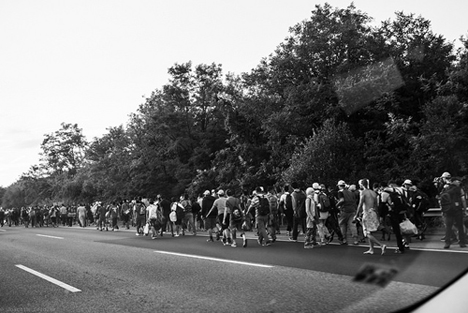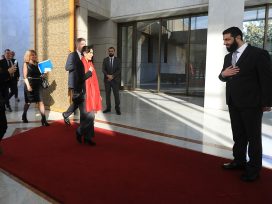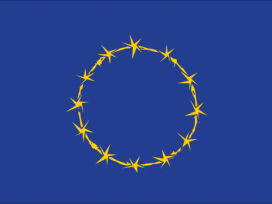What a paradox! The overarching political goal of the central and eastern European post-communist countries after the Cold War was to join the European Union. It took a long time to achieve, a whole of fifteen years or more. Yet, ten years have barely passed since eight post-communist countries simultaneously joined the EU, with three more entering in the interim, and all of a sudden the region’s political elites behave as if it had been the original western EU member states who desperately wanted to join the Council of Mutual Economic Assistance and the Warsaw Pact in order to share our deep-rooted and well-nurtured values.
The fact that Croatia is the only exception to the general rule of refusing to take in refugees should come as no surprise. Croatia’s EU membership is too recent for the country to have nurtured an appetite for lecturing others but, maybe even more importantly, many of its citizens know too well what is it like to be running for your life from a war.
Living in an alternative reality
The so called CEE attitude towards migration, pointing to “huge numbers of Ukraine migrants” already accepted in the region and emphasizing the need to defend borders and deal with the refugees before they set off for Europe, is actually no attitude at all. It is just the result of refusing to accept any responsibility, based partly on wishful thinking and partly on ignoring some elementary self-evident facts.

Refugees on the Hungarian M1 highway walking to Austria, 4 September 2015. Photo: photo_g. Source: Flickr
To say that the CEE countries have little tradition of dealing with refugees from other cultures is a meagre attempt to dress our institutional xenophobia and even racism up as something like a cultural heritage that western EU countries are somehow obliged to respect. They are not.
Angela Merkel is presented as irresponsible by many commentators in CEE, when she is precisely the opposite. The fact-based nature of public debate in Germany precludes her from escaping into the form of delusional wishful thinking that most of her CEE counterparts happily cultivate. She knows that vis-à-vis the current influx of refugees, there are only two options: accommodating it, or accepting more suffering and tragedies, including a possible humanitarian disaster in the Balkans.
And she also knows that if the EU shares the responsibility fairly, there is nothing we could not cope with. As her Austrian counterpart Walter Faymann has put it: “According to estimates, about 7.5 million people may come to Europe in the next several years. That would be 1.5 per cent of the EU population. Nobody has been able to convince me that we cannot properly handle this.”
The most striking observable difference between long-standing EU member states and the post-communist ones is in the mood of the public. While in the West the public is overwhelmingly sympathetic to refugees escaping the horrors of Syria and elsewhere, the overwhelming majority of people living in the post-communist countries is openly xenophobic.
Compare traditionally conservative milieus as the football fans: fans of Bayern, Arsenal and Real, among others, manifest their support for refugees; in CEE countries, we see football fans boycotting a Europa League match in protest against UEFA contributing one euro from the ticket price to refugees (Lech Poznan) or even displaying anti-refugee banners (Viktoria Plzen).
Of course, there is a sympathetic minority among CEE publics too, with dozens of volunteers helping the refugees relentlessly – driven among other things by the shame stemming from the official positions of their countries and the prevailing mood of the public. But this charming solidarity is displayed only by a quite tiny minority, that in a way resembles the minority formed by dissidents from the communist era.
Vivat homo sovieticus!
The late Soviet era was characterized by a pretence. Governments of eastern Europe pretended they were trying to build the best societies in the name of peace and brotherhood – and made their citizens pretend they believed it too – when in fact they were just some rough authoritarian states struggling to keep their regimes alive both economically and politically.
Today, the region’s political elites now pretend to have “specific historic experiences”, “relevant arguments”, “original solutions” and sometimes that they even truly care about the fate of refugees, when in fact they do whatever it takes to discourage refugees from entering their countries, including the use of barbwire fences on borders in the case of Hungary or incarceration and institutional stealing from refugees in the case of the Czech Republic.
Slovak prime minister Robert Fico even manages to pretend that while approving all those nasty things he is a social democrat. No wonder some of his counterparts in the European Parliament think differently.
But Fico is not alone. The overwhelming majority of CEE politicians, in accordance with the overwhelming majority of CEE publics, still chant unashamedly: “Say it loud and say it clear, Soviet values are still here.”
Premature enlargement – a fatal mistake?
How could this happen? Well, one cannot avoid thinking about the process of EU enlargement. It took a very long time to prepare, but judging by the outcome, it was either terribly mismanaged or premature or perhaps even both.
There was a good case for enlarging the EU immediately after the Cold War – in a similar manner to which Germany was unified. This “common Europe first, political harmonization later” approach would have the apparent advantage being built upon the enthusiasm that came out of the revolutions at the end of the Cold War.
The actual, later enlargement of the EU was based on the assumption that countries meeting a set of legal and economic criteria were fit to join. It was believed this would bring about a “harmonization of standards”, which in itself was considered to be proof of common, shared values. It should be obvious by now that it was a terrible mistake, with potentially fatal consequences for the whole of the EU.
But there is another mistake that builds upon this. For the opulent development aid the new EU member states have been awarded is largely managed by those countries themselves, thus supporting above all the home-grown corrupt political and economic elites.
The CEE countries managed to avoid building quality media, a strong civil society and strong political parties firmly rooted in traditional European ideologies, while successfully pretending that they were complying with EU legal and economic guidelines. The new political and economic elites thrive, building upon the Soviet political culture of pretence, while democratic liberal virtues suffer.
As a matter of fact, one has to wonder who had an interest in pursuing EU enlargement without strict measures taken to ensure that all applicants were obliged to build a living, liberal democracy. Diluting – at least a little bit – the pool of more principled western politicians with much more easily corruptible politicians from the new member states looks like a smart move from the perspective of western corporate and financial lobbies. Even if it was not a plan, it has worked in such a way very well.
And this also gives us a clue as to what can be done next. The western leaders are completely right to threaten to withhold EU cohesion funds from CEE countries. Solidarity only makes sense if it works both ways.
But a re-evaluation of the cohesion policies should happen anyway. The funds should be used for real cohesion and invested in the development of strong independent media and strong civil society, not bloated infrastructure projects. Because only then can we too have a fact-based public debate. Only then can common European values of humanity might prevail over the Soviet tradition of pretence.
Does the fate of Greece under the EU’s dictate await us too? The only difference will be that in Greece, external pressure thwarted progressive trends which were supposed to help Europe regain its momentum, whereas in the Czech Republic, Slovakia and Hungary it could eliminate the rotten nationalist backwardness that no one in Europe cares about anymore.








